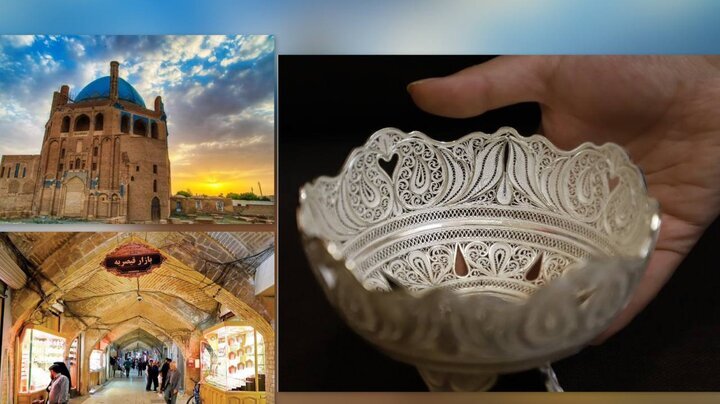Tehran has been designated as a “city of the world” by the World Craft Council, and Zanjan is celebrated with exquisite craftsmanship and long-standing traditions in the delicate art of delicate works.
Located on the Commercial Silk Road and the Transitways of Iran and Europe, Zanjan is known for its knives, traditional sandals and handicrafts such as Marile (Filigree).
Zanjan offers a wide variety of handicrafts and local products that reflect the city’s deep roots of artisan culture.
Zanjang souvenirs offer a blend of beauty, craftsmanship and cultural reliability. At the heart of this tradition is Marile Cali, a true symbol of the city’s artistic excellence.
Filigree has been popular in Zanjan for thousands of years. Zanjan is currently a reputation for being the birthplace of Filigree.
In 2019, the city was placed on the World Craft Council (WCC) list as Filigree’s World City. Currently, thousands of filigree artists are active at Zanjan’s filigree workshops. In addition to the workshops, many other centres are currently actively working to educate, supply and sell Filigree Works. This has led to widespread employment of people from various groups of Zanjan in this field.
Filigree (Marirekari)
Marile Kali is a traditional Persian silver filigree art, one of Zanjan’s most famous handicrafts, and is a city recognised worldwide for its proficiency in this delicate and intricate work. The craft is carefully soldered to create a decorative and functional item by twisting very fine silver wires into elaborate floral patterns and geometric patterns.
The art of Marile Kali in Zanjan dates back to centuries. Traditionally, it was used to create gorgeous items for aristocratic, religious institutions, and ritual purposes. Over time, skills were passed down for generations, and Zanjan became the national and present international centre for this exquisite craft.
Zanjan has been designated as a “city of the world” by the World Craft Council and is celebrated with its exquisite craftsmanship and long-standing tradition in the delicate art of delicate works.
Recognizing its cultural importance and craftsmanship, Zanjan was officially designated as “Filigree of World Cities” by the World Craft Council. Today, city workshops and artisan cooperatives continue to live this tradition, offering both classic and contemporary designs that are equally appealing to collectors and tourists.
Marile Kali is more than just an art, supporting the local economy, captivates cultural tourism, and strengthens Zanjan’s identity as a center of great Persian craftsmanship.
Traditional knife
Among the many famous crafts of Zanjang, the traditional knives of the city stand out for their craftsmanship, durability and artistic value. These handmade blades are not only practical tools, but also important souvenirs that reflect the region’s longstanding metallurgical traditions.
Zanjani knife is more than a tool. This is a symbol of heritage, pride and meticulous craftsmanship. Visitors to Zanjan often buy these knives as authentic and memorable souvenirs of the excellence of Iranian artisans.
Charoogh (traditional shoes)
Charoogh is a type of traditional handmade shoes that have been worn in Zanjan and parts of western Iran for centuries. These unique shoes reflect the region’s rich cultural identity and artisan skills. Once part of everyday outfits, today’s Sharp is produced mostly as cultural artifacts and decorative souvenirs.
Charoogh was traditionally worn by rural people, especially in mountainous and tribal areas, but was highly regarded for its flexibility, comfort and compatibility of walking on uneven terrain. Over time, Charoogh Making became a specialized craft and passed through a generation of local shoemakers.
Copper works
Coppersmith is an ancient Zanjan craft and has a long history. Currently, copper containers are made from copper sheets using hot and cold hammer methods. Zanjan produces a variety of copper containers, such as boilers, bowls, and tanker tubs.
Crafting Process: Artisans use hand techniques to shape items, ornament and carve traditional Persian motifs.
Common products: pots, trays, pitchers, samovas, vases, ornaments.
Modern relevance: Copperware is widely used in both traditional and modern Iranian homes and has been praised for its aesthetic appeal and health benefits when used in cooking.
Zanjan Jazim
Many people in Zanjan are engaged in jajim weaving. Zanjani Jajim is woven into a Twisted Wool called Alvan and has many uses such as BedSpreads, Mats, Underlays and more.
Sometimes cotton and silk threads are also used in jazim weave. Zanjan Jajims come in a variety of designs and colors, and tourists buy them as Zanjan souvenirs.
KD

